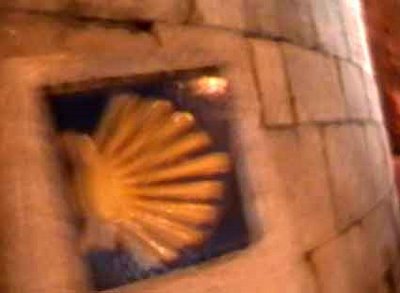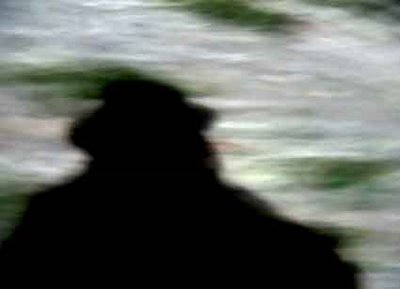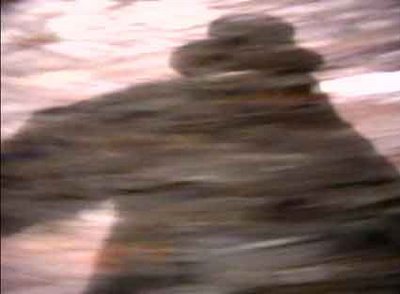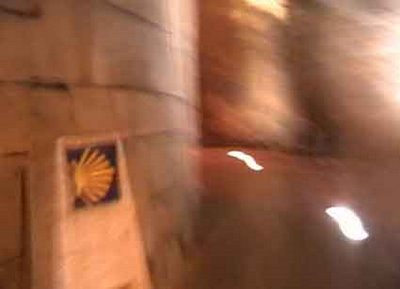22/38 'Night Time Walking'
 Video still: Camino sign; the scallop shell, pointing The Way in Lugo.
Video still: Camino sign; the scallop shell, pointing The Way in Lugo.
I did not feel any better in the morning. Walking was definitely off the agenda, not just for the day, but also for the next few days. I took a bus to the city of Lugo, a bigger, more comfortable and suitable place to stay put for a while and rest. Lugo is an amazing old city that has a its entire roman city wall still in place.
Although I stopped walking, the processing did not. I had intense dreams at night still haunting my consciousness the next morning; a cue for the need to process. So it is not necessary to walk to experience the benefits of El Camino. Maybe the key is that one is on the way to Santiago with the intention of it being a pilgrimage. Video still: persistant shadow in pursuit.
Video still: persistant shadow in pursuit.
I believe my Camino started from the moment it presented itself as the vision that came to me some weeks before I left for Europe. It started to have a subtle effect on me from that very moment, wether I was walking, sleeping, flying in the sky or doing something else. It had become part of my consciousness. The effects definitely intensified as I got closer to El Camino just like a magnet.
So even while 'being stopped in my tracks' I am 'walking' El Camino, day and night. As long as I am on my way to Santiago, the 'journey' will continue. It was good to be in a room on my own and not in a dorm of an albergue for the time being, so I could process in private.  Video still: shadow snooping around the walls of Lugo.
Video still: shadow snooping around the walls of Lugo.
In the old days, pilgrims were promised a reduction of their time spent in purgatory by half if they walked to Santiago. Was it a get-rich-scheme invented by the leaders of the church at the time? Was it medieval superstition? Or is there maybe some truth to it? How does a non-medieval-catholic make sense of it all? It all depends how one visualises or interprets the term 'purgatory'. First, I will need to let go of the my simplistic image of what pergatory is, which dates from my childhood, a time when religious education was as readily accepted as truth as the stories about Santa and Paulus de Boskabouter (a famous dutch leprechaun, who was my best friend).
Maybe it is a similar concept as the Bardo in Buddhism. Maybe purgatory represents the time spent after one’s death before recognising the tunnel of Light or Light itself (Heaven, Soul, God...). Perhaps that time is prolonged when unresolved issues are present and keeps one bound to the life that was instead of 'moving on' to wahtever you believe; heaven or reincarnation. Perhaps it does pay off to spend time with unresolved issues now, while being alive and well so you can die well without struggle when time comes. Is that perhaps why we get old and left with so much time to ponder? Time to practice 'letting go' of habits, addictions, mindsets, resentments, etc., before we die. Video still: where there is shadow, there is light; Camino gate Lugo.
Video still: where there is shadow, there is light; Camino gate Lugo.
I just learned from looking at Wikipedia that in the west the word ‘bardo’ refers to times when the usual way of life becomes suspended, as, for example, while walking El Camino. It continues by saying: “such times can prove fruitful for spiritual progress, as external constraints diminish, although they offer challenges because our unskilful impulses can come to the fore”, well that's El Camino alright! I have heard people talk about the temptations of old addictions coming back. Some begin smoking again, other resist and overcome the addiction. Are the addictions any different from emotional unresolved issues? In a way they are all attachments to something, be it a substance, food, or the egocentered need to be 'right' about someting or somebody. My pilgrimage seems to provide a stream of opportunities to let go of attachments.

